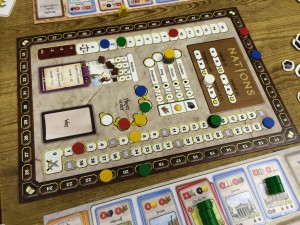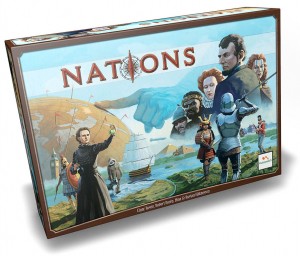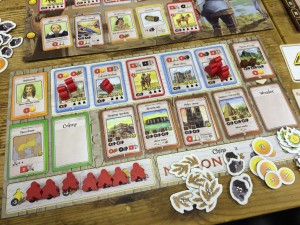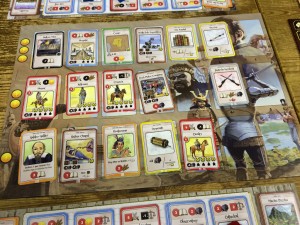Review: Nations
Posted by James (admin) on September 3rd, 2014
The first thing that strikes you about Nations is that it’s a civilisation game without a geographic board. Instead, Nations’ more abstracted approach to a civ-themed game delivers a very tight, and different, game for gamers.
Each player has a board showing a limited number of ‘slots’ where cards can be placed. Each slot is colour-coded to show which type(s) of cards (Buildings/Military, Advisor, Colony, and Wonders) can be placed there. There are also two central boards: The progress board (showing the cards available for purchase this round where the row dictates the cost) and the main game board (showing the players’ military strength/stability/total books, plus events, available architects, etc.)
During the game, players take turns to either: Buy 1 card, Deploy 1 worker, or Hire 1 architect to build a wonder. A purchased card must be immediately placed on your player board on a matching coloured slot – building over an existing card if necessary. This adds tension to the game because, not only do you need to figure out which cards will work well with your existing cards, but you need to consider what cards your opponents will be aiming for too. Also, the limited number of slots really makes you think about how to achieve lots with relatively little. (Note that Blue and Red cards share the same slots so more military means fewer buildings and vice versa.)
When all players have passed, the round ends and players collect resources (food, stone, gold, and books) based on their cards and workers. Every worker on the Building (blue) and Military (red) cards generates resources which means you have to consider what mix of cards you own as well as where your workers are located. Whilst there can be any number of workers on each card, the amount of workers a player owns is very limited, plus players have to pay stone to deploy (place) workers on cards (or move them to different cards). So, you need to decide which cards you want to ‘power’ with your workers and factor in the cost of deploying them too.

The central game board showing player’s military strength, total books, stability rating; plus, events, available architects, etc.
The Colony (green), Advisor (orange), and Wonder (brown) cards don’t require workers to generate resources, although Wonders require architects (limited in number each round) and resources to be spent to build them before they are active. Advisors and Wonders can provide special abilities too.
After collecting resources, there are several critical steps to assess before the next round:
- Player order: Based on military strength.
- War: If any player bought a war card, their military strength at the time of purchase sets the strength of the war. Players suffer a penalty if their military strength is now lower than the war’s strength, but a player’s stability can reduce this.
- Events: The round’s event card (drawn at the start of a round) is assessed. Some benefit the player having the most of a specific resource/factor; whereas, some events penalise players with the fewest of a specific resource/factor.
- Famine: Players spend food to avoid famine.
After every 2 rounds, the current era ends and victory points (VPs) are scored for players’ relative amount of books. Also, the next era’s cards enter play which deliver more resources than the previous era’s cards, but they also cost more to deploy workers onto them. Limited slots means covering up cards with new ones is inevitable – it allows you to change the mix, and amount, of resources you generate, although always at the expense of the card being covered.
At the end of the game, players score VPs for cards on their player board, total resources including military and books, plus VPs earned during the game. The multiple routes to scoring VPs means players can be weak in one scoring method but strong in another.
 Nations is a very enjoyable and intense game because you’re constantly balancing very limited resources which are all interconnected to meet multiple, changing demands, plus you always want more cards than you can afford and/or fit on your board. Everything is vital and being short of one resource at the wrong time can really cripple so the game can be unforgiving. Even hiring extra workers is risky as each one comes at a hefty on-going cost and workers can’t be un-hired (yes, workers are for life, not just for Christmas).
Nations is a very enjoyable and intense game because you’re constantly balancing very limited resources which are all interconnected to meet multiple, changing demands, plus you always want more cards than you can afford and/or fit on your board. Everything is vital and being short of one resource at the wrong time can really cripple so the game can be unforgiving. Even hiring extra workers is risky as each one comes at a hefty on-going cost and workers can’t be un-hired (yes, workers are for life, not just for Christmas).
Nations is about creating a ‘resource engine’ where your cards (and workers) work well with each other. The benefits/abilities from advisors and wonders can add quite a bit of variety too – for example, in one game, I managed to create a card combination that made me immune to the effects of losing a war (which allowed me to focus on other resources).
For some time, I’ve wanted to play a civilisation game without the direct warfare as I find the development of civilisations gets pushed to the background as soon as one opponent starts down the warfare route because you need to follow suit or be destroyed. Nations is less confrontational – military strength is very useful and can hinder other players, but not having it isn’t a total disaster and you can choose/plan to accept the negative effects of not generating military strength. (In one game, I bought a war card whilst having zero military strength as that ensured I couldn’t lose the war and suffer any penalty. Annoying the players with military cards by doing that made it even more worth it…)
There are a few nice extras to highlight such as the handicapping system where each player can pick a difficulty level (income per round) which allows players with different skill levels to play together. The game comes with basic, advanced and expert cards which should add variety and challenge in replay. Also, each player board has a standard side (which are all the same) as well as a specific side (which are all slightly different) such as having different numbers of coloured slots and starting resources/cards. There’s also a solo-play mode too.
With regards to negatives, I don’t feel the game really has any major ones. There’s a little bit of a luck element in the game but it’s not a big factor. A player can get lucky if the criteria an event is judged on matches their current status, but it’s unlikely this will happen every round. Also, there’s a bit of luck in which cards are available for purchase each round (and which row they are placed in as that determines the cost), because what you need may not be available forcing you to change your plan and adapt to the situation.
I really enjoyed Nations. It’s a very tight and tense game which can be quite unforgiving if you mess up your resource generation and leave yourself short of one item (especially stone). Direct player interaction is relatively light, mainly in the form of denying each other cards (which can be very effective) and competing for the events and war. Most civilisation games (such as Clash of Cultures) have a geographic board where players build cities, send their units to explore, and advance their tech tree. I like those games but Nations stands out by being different and delivers a meaty, challenging (and sometimes unforgiving) mix of civilisation-game with eurogame mechanics.
James.
[Played with 3 and 4 players]
P.S. I’m looking forwards to trying the Nations Dice Game being released at Spiel this year.



